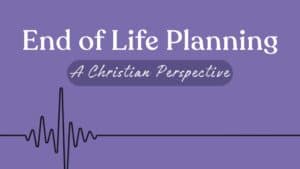Advance Medical Directives are documents intended to provide guidance to medical professionals and your loved ones, if you are incapacitated and cannot make your own medical decisions.
The two most frequently discussed documents are a “Living Will” Declaration and a Durable Power of Attorney for Health Care (sometimes offered as a combination document).
The “Living Will” Declaration is discouraged and the Durable Power of Attorney for Health Care is encouraged for the following reasons:
“Living Will” Declaration
*It is a vague statement generally stating a physician may withhold or withdraw treatment if you are terminally ill or unconscious.
*It is a piece of paper medical professionals may choose to ignore or often misinterpret.
*It can give blanket authority to a doctor you may or may not know, which is a serious concern in these days of managed care.
*It attempts to predict your preferences in often complex medical situations you cannot foresee by offering a narrow list of options that may be used to prohibit treatment you would want in a certain circumstance.
*It allows “treatment” to be defined by state law; in many states, medically assisted nutrition and hydration is considered medical treatment.
*It may be used to justify the removal of life-sustaining interventions (ventilators, feeding tubes, etc.) for patients who are disabled, but not dying.
*It generally supersedes the directions of a health-care agent named by the patient through a Durable Power of Attorney for Health Care (see below).
Durable Power of Attorney for Health Care
*It specifically names a person who will be your health-care agent to make your medical decisions in any crisis, regardless of prognosis.
*It gives decision-making authority to a loved one who knows your wishes and has discussed such decisions with you.
*It legally clarifies your health-care agent (as well as secondary agent if primary is unable to serve) instead of leaving such determination up to state law.
*It generally exempts doctors from liability, if they follow directions from your health-care agent.
*It defers all decisions to your health-care agent, resource “Discussing Your Medical Wishes: A Patient’s Guide“.
Other Information to Consider
The first “living will” was devised in 1967 by members of the Euthanasia Society of America, now known as Choice in Dying.
The Patient Self-Determination Act of 1990 requires health-care facilities receiving federal funds to ask patients upon admission if they have or want to sign an Advance Medical Directive. However, the best time to consider and sign such a document is before you are ill, injured or hospitalized.
The existence of a medical treatment or technology does not obligate you to utilize it in every circumstance. There is a “time to die” and let nature take its course when medicine and medical technology cannot reverse the dying process.
Making the Most of a Durable Power of Attorney for Health Care
A Durable Power of Attorney for Health Care document allows you to name a trusted health-care agent to make decisions for your medical treatment and care, if you are unable to do so.
So, how does your health care agent know your wishes and preferences? For the reasons stated above, a traditional “living will” declaration is not the best vehicle for communicating with your health-care agent. It is better to discuss your views with your agent outside of a formal, legal document. To assist you in this process, see the complimentary online resource.
How to Obtain a Durable Power of Attorney for Health Care
All states have statutes allowing Advance Medical Directives, including a Durable Power of Attorney for Health Care (or equivalent). Copies of the document approved in your state may be obtained through an attorney, your state legislature or Probate Court. You do not have to hire an attorney in order to sign this legal document.
However, not everyone is comfortable with the standard language provided in a state statute. For individuals who want to ensure their advance directive reflects a pro-life/anti-euthanasia position, we recommend a document created by the Patients Rights Council. This document, titled the “Protective Medical Decisions Document” (PMDD), defines and prohibits euthanasia, as well as directs that “food and water (nutrition and hydration) be provided unless death is inevitable and truly imminent.” The PMDD is a general Durable Power of Attorney for Health Care that allows the signer to name a trusted family member or friend to make medical decisions in the event the signer is incapacitated for any reason, not just terminal illness.
Note: This information sheet is intended as general information and does not constitute legal or medical advice. For professional counsel, please contact an attorney or physician. State laws vary regarding the legality and particular details of Advance Medical Directives.















